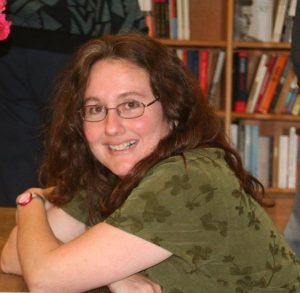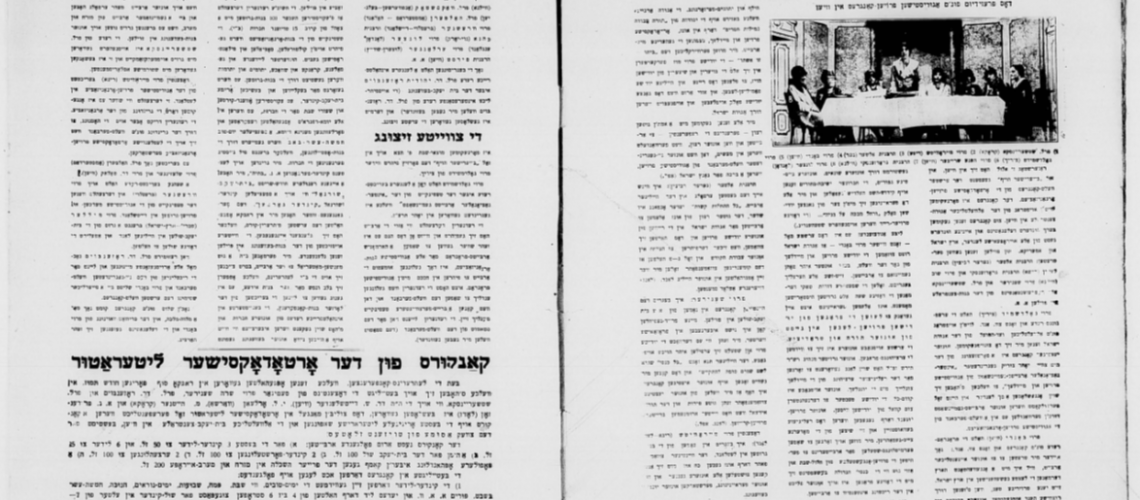At the Second World Congress of Agudath Israel in 1929, Bais Yaakov was represented by various activists, and the Neshei Agudath Israel, a women’s branch of the organization, was founded. The Bais Yaakov Journal covered the excitement leading up to the event as well as the speeches and moments of interest after the congress. Below is a translation of the coverage which appeared in Issue #47 of the Journal. In the coming weeks, I’ll be sharing translations of ther Journal pieces about the Congress, as well as some speeches as they appear in Sarah Schenirer’s Collected Writings, along with some analysis of the event.
 The dais at the Neshei Agudath Israel Women’s Conference at the 1929 World Congress of the Agudath Israel, held at the Bayerischer Hof [Bavarian Court] hotel in Vienna during the same week that the Agudah met at the Sofiansaal Concert Hall.
The dais at the Neshei Agudath Israel Women’s Conference at the 1929 World Congress of the Agudath Israel, held at the Bayerischer Hof [Bavarian Court] hotel in Vienna during the same week that the Agudah met at the Sofiansaal Concert Hall.
From left to right: Mrs. Fanny Lunzer (London), Rebbetzin Leah Grodzinski (Vilna), Mrs. Henny Schreiber (Vienna), Mrs. Franziska Goldschmidt (Zurich), Mrs. Ernestine Bondi (Vienna), Rebbetzin Feyge Mintshe Alter (Gur), Mrs. Malka Meierovitsh (Riga), Miss Lotka Szczarańska (Sharansky, a teacher at the seminary in Kraków).
The speakers included three wives of distinguished leaders and Bais Yaakov supporters from east Europe, Abraham Mordechai Alter (the Gerer Rebbe), Chaim Ozer Grodzinski (Chief Rabbi of Vilna), and Aharon Levin (the Raysher Rov], and two local women, Mrs Bondi and Mrs Schreiber, who served on the Bais Yaakov committee in Vienna and who had family connections to Samson Raphael Hirsch and the Hatam Sofer and Akiva Eiger, respectively. Mrs. Lunzer served on the Beis Yaakov committee in London. Mrs. Meierovitz, a teacher at the Torah V’Derekh Eretz girls’ school in Riga, reported on Bnos in Latvia, while Miss Szczarańska reported on Bnos in Poland. Mrs. Goldschmidt, who chaired the conference, was the daughter of the chief rabbi of Zurich, Tuvia Lewenstein, and headed the international committee that worked to link the women’s initiatives of the Agudah in the two years before the founding of the Neshei Agudath Israel.
Courtesy of the Jewish Museum Vienna/Archive, number 003808_1. For more on Rabbi Aharon Levin, see http://aaronlevine.info/reisha/reisha-rav-harav-aharon-levine-hyd/

On Thursday, Elul 7 [September 12, 1929], the first World Congress of Orthodox women’s organization was launched in the hall of the “Bayerischer Hof” Hotel in Vienna. This Congress was initiated and organized by the International Agudath Israel Office in Vienna. Approximately a hundred delegates and another few hundred guests from throughout Europe, the Land of Israel, and the University States attended the Congress. Participants from Poland included: The Gerer Rebetzin, [Feyge Mintshe Alter], Rebbetzin [Dobe] Levin (Rzeszów, or Raysha), Rebbetzin Grodzensky and Mrs. Shaub (Vilna), Mrs. Schenirer and Miss [Lotka] Szczarańska as representatives of the Central Office of Bnos in Poland.
Mrs. [Franziska] Goldschmidt (Zurich) chaired the opening session, explaining, among other things, that the Congress had been convened by order of the International Executive Committee of the Agudath Israel. The present Congress emerged from the “International Committee of Agudah Women and Girls” that was founded two years ago, and which already encompassed many countries; the present Congress is a culmination of the work of this group, which would now be transformed into the “World Union of Orthodox Women’s Organizations.”
Mrs. [Ernestine] Bondi (Vienna) gave the keynote address, saying, among other things:
Before we move on to our own work, I want to recall with a heavy heart recent events in the Land of Israel. Since those sorrowful days when our brothers and sisters were murdered in the Holy Land, we have all been filled with sadness and grief. Our sacred land has again been drenched in the innocent blood of our sons and daughters. The last remnant of our ancient glory, the Western Wall, for which we have yearned since our childhood, has been stormed by our enemies. Our spiritual heroes, the yeshiva students of Hebron, heroically fell for the sanctification of God’s name and the entire Jewish people are united in the sorrow of “Rachel cries for her children” (the audience remained standing during this eulogy).
Dear participants! This is the first time—Mrs. Bondi continued—that Agudath Israel is convening Orthodox women and girls from the entire world, in order to work together under its banner. Let me greet you all with the warmest greetings. Let generations to come truly remember this hour as a momentous historical occasion. We are all united here in one intention: To resolve the questions of Jewish women’s lives in the spirit of our Torah and tradition. Our first task is dedicated to the education question. Our great leader, Rabbi Samson Raphael Hirsch, long ago warned us to take as great care for the education of girls as of boys. Our task is first of all to bring Jewish girls closer to the sources of Jewish knowledge. Our young women must acquire a religious consciousness that can protect them from the dangers of modern life. We must organize employment agencies that will allow women workers to avoid work where they will have to desecrate the Sabbath. And just as the World Congress is taking up these questions, so too must we work intensively along the same paths.
I do not have to remind you again—the speaker continued—that from this moment when we belong to Agudath Israel, our mission is to support all the Agudah’s activities both in the diaspora and the Land of Israel. We must pay special attention to supporting the Bais Yaakov schools. We must also work energetically in the fields of social work and care for orphans. The work of the Agudah, which is based on the principles of “Torah, avodah u’gemilut hasadim” (Torah, Temple worship [or prayer], and good deeds),” must find worthy in us, Orthodox women and girls. We must fulfill the principle of “His house is his wife”—the Jewish woman must embody in herself the construction and protection of the Jewish home, to maintain the pure and holy Jewish family life. That is how the entire Jewish people will be revived and renewed through Agudath Israel.
We have all come with truly good intentions—the speaker concluded—to get to work, and when our intentions are transformed into deeds, our newly formed international organization of Agudah women will be a blessing for all the Jewish people (applause).
Rebbetzin Alter (the Gerrer Rebbetzin): I wish you the best of success in your sacred work. “All beginnings are difficult,” but our sincere desire to work for the Agudah among Jewish women, and our unity, will certainly result in the realization of our holy endeavors. May God help us and grant that our next meeting will be held in in our Holy Land (sustained applause).
Mrs. Schenirer: I greet this World Congress in the name of the Bais Yaakov schools of Poland. I cannot describe my joy in prosaic words. We see here the awakening of the Jewish woman to her exalted mission. The holy sage said: “Any gathering that is for the sake of heaven will conclude on solid ground”, and we can certainly say that this is true of our present Congress. I hope that we will see bountiful fruits of this gathering, and that the Torah ideal will continue to inspire broader and broader circles of women (long applause).
Professor Maierovitsh (Riga, Latvia): I greet you in the name of the Bnos chapters in Latvia. This gathering today must give us strength and courage to face our opponents, and our unity will surely fortify our youth movement.
Rebbetzin Hirschler (Pressburg, Czechoslovakia) delivered extensive welcoming remarks, discussing the significance of the Agudah’s women’s movement for the revival of the Jewish people and Jewish family life.
The chairwoman concluded by reading aloud a long letter from the editorial board of the Bais Yaakov Journal.

Naomi Seidman is the Chancellor Jackman Professor of the Arts in the Department for the Study of Religion at the University of Toronto and a 2016 Guggenheim Fellow; her 2019 book, Sarah Schenirer and the Bais Yaakov Movement: A Revolution in the Name of Tradition, explores the history of the movement in the interwar period.


